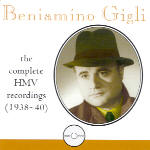The latest in Romophone’s invaluable series of the complete Gigli traces the tenor’s HMV song and aria recordings made between 1938 and 1940, when he was 50 but didn’t sound it. In fact, any young singer today with a voice like this one would be king of the hill. He’d also be laughed off the stage if he committed the stylistic transgressions found on this disc, such as the transformation of Schubert’s “Ständchen” and Brahms’ “Wiegenlied” into German-language serenatas, the slides and line-breaking gasps in Don Ottavio’s arias from Don Giovanni, and the soupy sentimentality with which he sings an arie antiche like Caccini’s “Amarilli”. And yet, that last instance of stylistic mayhem is a highlight of the recording because it is sung with such perfect control, such dulcet tones, and such rainbow colors in the voice that any historically informed performance of today would sound paler than pale alongside it.
Here, as elsewhere, his mezzavoce is a thing to treasure, a timbre of incredible softness, yet firm, without the reedy fragility of lesser mortals. Even in the Mozart arias his free-wheeling style (or absence thereof) is no more objectionable than what we sometimes hear today from miscast Ottavios, and the voice itself is such a thing of beauty that we are forced to abandon critical faculties and just enjoy it for what it is. Hedonism trumps scholarship when it comes to listening to Gigli.
That golden voice is what makes Gigli’s art timeless, excesses and all. And it was relatively intact in the years covered here–only separated from the younger Gigli by a weightier timbre and a marginal loss of color in the lower part of his range. As expected, there’s a fair share of sobs and near-sobs, none more blatant than his scenery-chewing “No! Pazzo son” from Puccini’s Manon Lescaut. At this stage too, he was gravitating to heavier roles. No spinto, he turns his lyric tenor to Manrico with results attractive in themselves–a fervent “Di quella pira” and a touching “Al nostri monti” duet with Cloe Elmo–yet wanting a heftier voice for maximum impact. The Traviata duets–“Un di felice” and “Parigi, o cara”, with Maria Caniglia–suffer from an unstylish excess of verismo emotion. Most of the tracks are Italian songs and here Gigli’s untouchable. The style is as natural as breathing for him and the results are pure gold. He makes Tosti’s “Aprile” an unforgettable joy and Donaudy’s “O del mio amato ben” a veritable textbook illustration of lovingly warm singing. So don’t worry about this little vocal flaw or that minor stylistic offense; only the hardest of hearts will be able to resist Gigli’s magic.
































